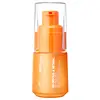What's inside
What's inside
 Key Ingredients
Key Ingredients

 Benefits
Benefits

 Concerns
Concerns

 Ingredients Side-by-side
Ingredients Side-by-side

Water
Skin ConditioningPropylene Glycol
HumectantSorbitol
HumectantErythritol
HumectantRetinol
Skin ConditioningRetinyl Palmitate
Skin ConditioningRetinyl Retinoate
Skin ConditioningRetinyl Linoleate
Skin ConditioningRetinyl Acetate
Skin ConditioningRetinyl Propionate
Skin ConditioningCarbomer
Emulsion StabilisingHydroxyacetophenone
AntioxidantPropanediol
SolventCentella Asiatica Extract
CleansingPolysorbate 80
EmulsifyingPolyglyceryl-10 Myristate
Skin ConditioningCaprylhydroxamic Acid
Ethylhexylglycerin
Skin ConditioningPEG-40 Hydrogenated Castor Oil
EmulsifyingPotassium Hydroxide
BufferingIsononyl Isononanoate
EmollientCaprylic/Capric Triglyceride
MaskingPaeonia Suffruticosa Root Extract
Skin ProtectingGlyceryl Caprylate
EmollientCeramide Ns
Skin ConditioningCeramide NP
Skin ConditioningCeramide Ng
Skin ConditioningCeramide Eos
Skin ConditioningCeramide EOP
Skin ConditioningCeramide As
Skin ConditioningCeramide AP
Skin ConditioningResveratrol
AntioxidantBifida Ferment Extract
HumectantCamellia Reticulata Seed Oil
EmollientHexapeptide-8
Skin ConditioningHydrolyzed Hyaluronic Acid
HumectantHyaluronic Acid
HumectantSodium Hyaluronate
HumectantTocopheryl Acetate
AntioxidantOligopeptide-1
Skin ConditioningCarnosine
Skin ConditioningSodium Acetylated Hyaluronate
HumectantHydroxypropyltrimonium Hyaluronate
Hydrogenated Lecithin
EmulsifyingBHT
AntioxidantWater, Propylene Glycol, Sorbitol, Erythritol, Retinol, Retinyl Palmitate, Retinyl Retinoate, Retinyl Linoleate, Retinyl Acetate, Retinyl Propionate, Carbomer, Hydroxyacetophenone, Propanediol, Centella Asiatica Extract, Polysorbate 80, Polyglyceryl-10 Myristate, Caprylhydroxamic Acid, Ethylhexylglycerin, PEG-40 Hydrogenated Castor Oil, Potassium Hydroxide, Isononyl Isononanoate, Caprylic/Capric Triglyceride, Paeonia Suffruticosa Root Extract, Glyceryl Caprylate, Ceramide Ns, Ceramide NP, Ceramide Ng, Ceramide Eos, Ceramide EOP, Ceramide As, Ceramide AP, Resveratrol, Bifida Ferment Extract, Camellia Reticulata Seed Oil, Hexapeptide-8, Hydrolyzed Hyaluronic Acid, Hyaluronic Acid, Sodium Hyaluronate, Tocopheryl Acetate, Oligopeptide-1, Carnosine, Sodium Acetylated Hyaluronate, Hydroxypropyltrimonium Hyaluronate, Hydrogenated Lecithin, BHT
Cyclopentasiloxane
EmollientDimethicone
EmollientDimethiconol
EmollientVinyl Dimethicone/Lauryl Dimethicone Crosspolymer
Polysorbate 20
EmulsifyingRetinol
Skin ConditioningPEG-8
HumectantTocopherol
AntioxidantAscorbyl Palmitate
AntioxidantAscorbic Acid
AntioxidantCitric Acid
BufferingRetinyl Palmitate
Skin ConditioningRetinyl Acetate
Skin ConditioningC12-15 Alkyl Benzoate
AntimicrobialTribehenin
EmollientCeramide Ns
Skin ConditioningPEG-10
HumectantPEG-5 Rapeseed Sterol
CleansingPalmitoyl Oligopeptide
CleansingCyclopentasiloxane, Dimethicone, Dimethiconol, Vinyl Dimethicone/Lauryl Dimethicone Crosspolymer, Polysorbate 20, Retinol, PEG-8, Tocopherol, Ascorbyl Palmitate, Ascorbic Acid, Citric Acid, Retinyl Palmitate, Retinyl Acetate, C12-15 Alkyl Benzoate, Tribehenin, Ceramide Ns, PEG-10, PEG-5 Rapeseed Sterol, Palmitoyl Oligopeptide
Ingredients Explained
These ingredients are found in both products.
Ingredients higher up in an ingredient list are typically present in a larger amount.
Ceramide NS is formally known as Ceramide 2. It is one of the major ceramides in the stratum corneum (outermost layer of skin) plays a role in forming a protective barrier.
Due to its structure, skin lipids can be packed tightly and in turn, this strengthens the barrier and reduces water loss.
Studies show conditions like atopic dermatitis can worsen when ceramide NS levels are low.
Learn more about Ceramide NsRetinol is a gold-standard ingredient for anti-aging. It is a form of Vitamin A and belongs to the class of retinoids that also includes tretinoin.
Why is retinol famous?
It has the most scientific studies backing up its skin benefits out of all the non-prescription ingredients.
Retinol is proven to:
This is why retinol is effective at removing wrinkles, fading dark spots, treating acne, and reducing the appearance of pores.
Studies show retinol is less effective when exposed to UV. Be sure to look for appropriate packaging to keep your retinol potent (similar to Vitamin C).
Using retinol or any retinoids will increase sun-sensitivity in the first few months. Though studies show retinoids increase your skin's natural SPF with continuous use, it is best to always wear sunscreen and sun-protection.
We recommend speaking with a medical professional about using this ingredient during pregnancy.
Retinol may cause irritation in some people, so be sure to patch test. Experts recommend 'ramping up' retinol use: start using this ingredient once a week and work up to using it daily.
Read about Tretinoin
Learn more about RetinolRetinyl Acetate is part of the retinoid family. It is made from retinol and acetic acid.
Though retinyl acetate is more stable than retinol, it is also less effective and less irritating. This is due to the conversion line all retinoids have to go through.
All retinoids must be converted to retinoic acid. The further away from this end result, the less effective the ingredient is.
Fun fact: Retinyl acetate is commonly used as a Vitamin C additive for foods.
Learn more about Retinyl AcetateRetinyl palmitate is a form of retinoid. Retinoids are the superstar class of anti-aging ingredients that include tretinoin and retinol.
This particular ingredient has had a bumpy year with its rise and fall in popularity.
First, Retinyl palmitate is created from palmitic acid and retinol. It is a retinol ester and considered one of the weaker forms of retinoid.
This is because all retinoids have to be converted to Tretinoin, AKA retinoic acid. Retinyl Palmitate is pretty far down the line and has to go through multiple conversions before its effects are seen.
Due to this long and ineffective conversion line, the benefits of Retinyl Palmitate are debated.
Studies show Retinyl Palmitate to help:
Dermatologists say this ingredient is ineffective because it isn't used in high enough concentrations in cosmetics.
This ingredient used to be found in sunscreens to boost the efficacy of sunscreen filters.
The downfall of Retinyl Palmitate was due to released reports about the ingredient being correlated to sun damage and skin tumors.
While there is a study showing this ingredient to cause DNA damage when exposed to UV-A, there is no concrete proof of it being linked to skin cancer. It is safe to use when used correctly.
All retinoids increase your skin's sensitivity to the sun in the first few months of usage. Be especially careful with reapplying sunscreen when using any form of retinoid.
Currently, this ingredient is still allowed in cosmetics all over the world. In Canada, cosmetics must have a warning label stating the product to contain Retinyl Palmitate
Fun fact: This ingredient is often added to low-fat milk to increase the levels of Vitamin A.
Learn more about Retinyl Palmitate